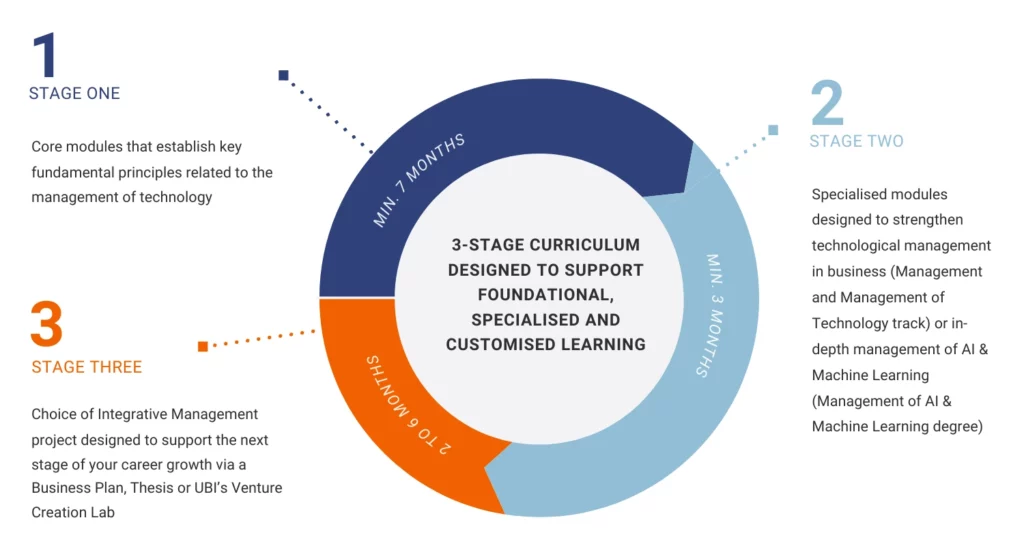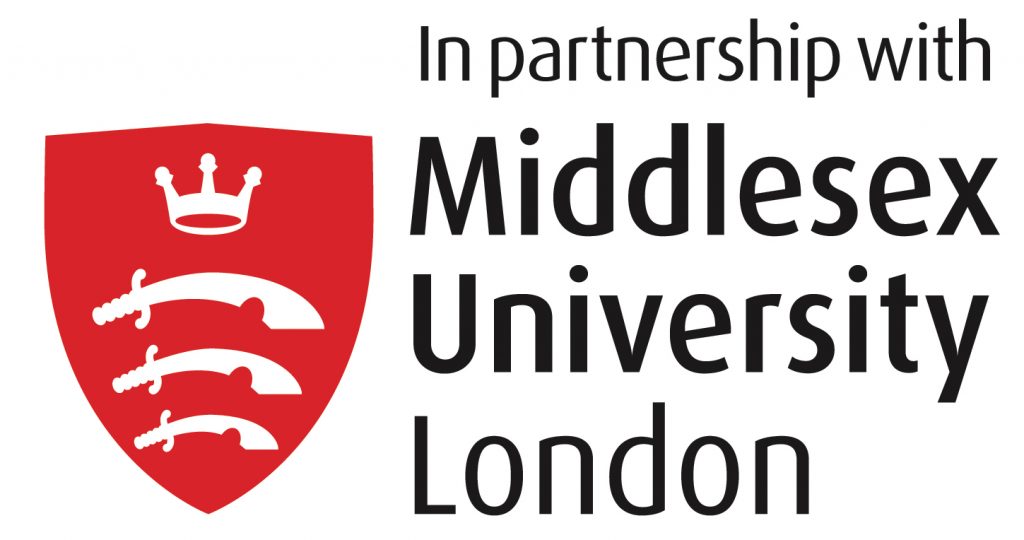Master in Mgt of AI & Machine Learning
Master in Mgt of Technology
Master in Management
Overview
UBI’s master programmes meet the demand in the global labour market for professionals who can guide their organisations to compete in today’s global and technology-led economy. According to the Future of Work Report, there will be a point in the near future when all the technology has been built and the demand for software programmers and data scientists will deplete. Consequently, what is needed are people who can work with technology and apply their interpersonal and leadership skills. In this context, each of UBI’s master programmes stimulates multidisciplinary orientation with an emphasis on applying these technologies to hone entrepreneurial agility for future leaders, strengthen business models and gain a competitive edge for years to come.
This avant-garde programme focuses on how Artificial Intelligence and its tools (e.g. generative AI, automation, data modelling, edge computing, etc) are instrumental towards creating or strengthening business models and ensuring sustainable economic growth.
This programme creates technology-led leaders and develops high-quality professionals who have an advanced understanding of companies’ value creation processes in an increasingly technology-led environment
The programme focuses on sharpening the managerial and leadership skills necessary to achieve both the strategic and operational objectives of organisations through sustainable entrepreneurship and innovation in the globalised world.
UBI’s master programmes meet the demand in the global labour market for professionals who can guide their organisations to compete in today’s global and technology-led economy. According to the Future of Work Report, there will be a point in the near future when all the technology has been built and the demand for software programmers and data scientists will deplete. Consequently, what is needed are people who can work with technology and apply their interpersonal and leadership skills. In this context, each of UBI’s master programmes stimulates multidisciplinary orientation with an emphasis on applying these technologies to hone entrepreneurial agility for future leaders, strengthen business models and gain a competitive edge for years to come.
Management of
AI & Machine Learning
Management of
Technology
Management
This avant-garde programme focuses on how Artificial Intelligence and its tools (e.g. generative AI, automation, data modelling, edge computing, etc) are instrumental towards creating or strengthening business models and ensuring sustainable economic growth.
This programme creates technology-led leaders and develops high-quality professionals who have an advanced understanding of companies’ value creation processes in an increasingly technology-led environment.
The programme focuses on sharpening the managerial and leadership skills necessary to achieve both the strategic and operational objectives of organisations through sustainable entrepreneurship and innovation in the globalised world.

Data source: European Commission
Why study a Master in Management of AI and Technology?
- Over 70% of businesses state the lack of digital and technology management skills as an obstacle to investment and growth
- Over 805,000 digital leaders will be needed by 2025
- 70% of new value created globally over the next 10 years will be based on digital and technology-based business model
- Increasing demand for equal representation of genders on technology-related studies
Programme Highlights
In-person, hybrid, and virtual ecosystem mimicking professional environments
Offers flexibility and support for working professionals.
Deepens student engagement by reducing disruptions to their professional and personal lives.
Maximises quality of learning by leveraging the use of technology, overcoming the limitations of full on-campus teaching.
Reflect current and future hybrid work realities in many professional domains.
Engagement with leading technological companies
- Industry-led curriculum developed in consultation with leading technological companies and professionals.
- Access to world market workshops and meetings with practitioners from UBI’s corporate partners.
- Prominent guest speakers and valuable internship opportunities.
- Programme supported by BECI, with special fees for its members.
UBI's Venture Creation Lab and First-Hand International Experience
- Through guidance from entrepreneurs and working with simulators, students learn how to develop the right skill sets and management teams to create innovative technology-based companies in UBI’s Venture Creation Lab.
- International business experience with opportunities at UBI locations and partners such as LSE or Babson College (Optional)
Dedicated focus on personal professional growth
- Class sizes of 30-35 students for all delivery modes
- One-on-one coaching and mentorship from technological leaders to support individual growth and development
- UBI’s Career Services: personal branding workshops, career progression counselling and opportunities for networking in various technological sectors
3-stage curriculum designed to support foundational, specialised and customised learning
- Stage One: core modules that establish key fundamental principles related to the management of technology
- Stage Two: Specialised modules designed to strengthen technological management
in business (Management and Management of Technology track) or in-depth management of AI & Machine Learning
(Management of AI & Machine Learning degree) - Stage Three: Integrative Management project designed to support the next stage of your career growth via a Business Plan, Thesis or UBI’s Venture Creation Lab


In-person, hybrid, and virtual ecosystem mimicking professional environments
- Offers flexibility and support for working professionals.
- Deepens student engagement by reducing disruptions to their professional and personal lives.
- Maximises quality of learning by leveraging the use of technology, overcoming the limitations of full on-campus teaching.
- Reflect current and future hybrid work realities in many professional domains.
Engagement with leading technological companies
- Industry-led curriculum developed in consultation with leading technological companies and professionals.
- Access to world market workshops and meetings with practitioners from UBI's corporate partners.
- Prominent guest speakers and valuable internship opportunities.
- Programme supported by BECI, with special fees for its members.
UBI's Venture Creation Lab and First-hand International Experience
- Through guidance from entrepreneurs and working with simulators, students learn how to develop the right skill sets and management teams to create innovative technology-based companies in UBI's Venture Creation Lab.
- International business experience with opportunities at UBI locations and partners such as LSE or Babson College (Optional).
Dedicated focus on personal professional growth
- Class sizes of 30-35 students for all delivery modes.
- One-on-one coaching and mentorship from technological leaders to support individual growth and development.
- UBI’s Career Services: personal branding workshops, career progression counselling and opportunities for networking in various technological sectors.


Structure

STAGE ONE
Common Core Modules
- Ethics, responsibility, & sustainability
- Professional skills for the works of the future
- Wellbeing and effective use of transformative technologies
- Business strategy
- Python applied in business
- Data visualisation and storytelling
- Business Analytics
STAGE TWO
Specialised Modules
Management of AI & Machine Learning
- Artificial intelligence in business
- Database management
- Neural networks & deep learning applied to business
Management of Technology
- Entrepreneurship and innovation
- Finance and technology
- Smart operations
Management
- Entrepreneurship and innovation
- Artificial intelligence in business
- Data-driven marketing
STAGE THREE
Integrative Management Project
- Option 1: Thesis OR
- Option 2: Business Plan or Consultancy for an existing business OR
- Option 3: UBI Venture Creation Lab
Common Core Modules
Stage One
- Ethics, responsibility, and sustainability
- Professional skills for the works of the future
- Wellbeing and effective use of transformative technologies
- Business strategy
- Python applied in business
- Data visualisation and storytelling
- Business analytics
Management of AI and ML
Management of
Technology
Management
Stage Two
- Artificial intelligence in business
- Database management
- Neural networks & deep learning applied to business
- Entrepreneurship and innovation
- Finance and technology
- Smart operations
- Entrepreneurship and innovation
- Artificial intelligence in business
- Data-driven marketing
Integrative Management Project
Stage Three
- Option 1: Thesis OR
- Option 2: Business Plan or Consultancy for an existing business OR
- Option 3: UBI Venture Creation Lab
Degrees awarded upon completion
With the successful completion of the master programme, graduates will obtain an accredited British degree issued by Middlesex University London (UK) in accordance to their chosen specialisation:
- MSc Management (Artificial Intelligence and Machine Learning)
- MSc Management (Technology)
- MSc Management
All UBI Business School programmes are validated by Middlesex University London, an institution with a distinguished heritage of excellence and innovation in higher education. It is one of the top 100 Young Universities in the World and top 10 transnational universities in the world (Times Higher Education).
This is a programme developed, delivered, and assessed by UBI Business School, and quality assured by Middlesex University. Students receive a Middlesex award upon successful completion.
Speak to our admissions team to find out more
Typical candidate profile
The programme welcomes recent graduates and working professionals driven by the desire to be innovative, disruptive, and resilient global leaders. The programme also advances managerial opportunities for professionals working in or seeking a career in technological companies and technology-based organisations.
Master in Management of AI & Machine Learning
Candidate profile
- Candidates from a business/technical background who wish to combine the expertise in AI/ML with managerial and leadership skills towards the value creation of organisation.
Career opportunities
- AI product management
- Big data management
- Data governance and analysis
- Database management
- Digital automation management
- Digital transformation management
- Fintech management
- IT/AI/ML consulting
Master in Management of Technology
Candidate profile
- Business/technical professionals seeking to develop the managerial skills needed to navigate the complex intersection of technology and business across industries.
Career opportunities
- Digital marketing management
- Digital project management
- Fintech management
- Information systems management
- IT strategy consulting
- Management of technological innovations
- Tech start-up
Master in Management
Candidate profile
- Recent graduates and working professionals from diverse backgrounds interested in advancing their career through the development of international management skills to develop global organisations.
Career opportunities
- Business process development
- General management
- Financial modelling and analysis
- Innovation manager
- Management consulting
- Marketing manager
- Supply chain management
Master in Management of AI & Machine Learning
Master in Management of Technology
Master in Management
Candidate Profile
Candidates from a business/technical background who wish to combine the expertise in AI/ML with managerial and leadership skills towards the value creation of organisation.
Business/technical professionals seeking to develop the managerial skills needed to navigate the complex intersection of technology and business across industries.
Recent graduates and working professionals from diverse backgrounds interested in advancing their career through the development of international management skills to develop global organisations.
Career Opportunities
- AI product management
- Big data management
- Data governance and analysis
- Database management
- Digital automation management
- Digital transformation management
- Fintech management
- IT/AI/ML consulting
- Digital marketing management
- Digital project management
- Fintech management
- Information systems management
- IT strategy consulting
- Management of technological innovations
- Tech start-up
- Business process development
- General management
- Financial modelling and analysis
- Innovation manager
- Management consulting
- Marketing manager
- Supply chain management
The above is a broad overview of typical candidates anticipated in the programme, and may not represent the profile of all eligible candidates.
Admission Requirements
- Undergraduate degree
- For Brussels: English (min. IELTS 6.0 or TOEFL IBT 7.2)
- For Madrid:
- - Proof of command of the Spanish language, mainly level C1 (CEFR).
- - Proof of command of the English language, level B2 level (or equivalent) for reading only.
Delivery Model
DELIVERY MODEL, LOCATIONS, AND KEY FACTS
- 90 ECTS
- 180 hours of synchronous classes (real-time)
- 180 hours of asynchronous structured learning
- Programme duration: 12 or 24 months, adapting the pace of studies according to students’ personal and professional needs
- Programme intake: January and October
- Language of delivery: Brussels - English | Madrid - Spanish
- Synchronous sessions schedule (every other week): Fridays 13:30 - 18:30 & Saturdays 9:00 - 13:00
Admission Process
Applicants are invited to apply directly online (click here). Along with an application form, applicants need to submit:
Latest degree transcript giving final degree result and breakdown of individual subjects and grades (in English, Spanish or French).
Proof of command of the English or Spanish language depending on the choice of campus (see “admission requirements”).
Passport or ID card
“Professional” portrait photo
CV
Any other certificate of academic achievement / other awards, if applicable
Two reference letters. These letters are expected to make explicit reference to the applicant’s potential to develop a professional career in business and to pursue Master’s level studies.
500-word personal statement: a critical analysis of the programme’s potential contribution to the applicant’s personal and professional development.
Note: All students attending UBI programmes are expected to bring their personal laptops for all academic activities.
The admissions team assesses each application package and makes recommendations based on the academic requirements and on the candidate’s overall suitability for the programme.
Candidates recommended by the admissions team are invited for a 30-minute interview with the Programme Director. Interviews for candidates are usually conducted online via Zoom.
- Prior to the interview, applicants need to submit a 500-word professional essay on a modern topic which will be communicated to the applicant beforehand.
Successful candidates receive a letter offering admission within 30 days of the personal interview.
UBI welcomes students from a wide range of backgrounds to maintain a diverse student body and promote a stimulating learning environment. Applicants are not discriminated against on the grounds of political views, race, ethnicity, nationality, gender, sexual orientation, religion, disability or age.
Rates for enrolment in Academic Year 2023-2024:
The regular tuition fees for students enrolling in UBI’s MSc programmes is €11,900 for EEA citizens and €17,000 for non-EEA citizens.
- UBI offers a wide range of scholarships and tuition support programmes for prospective and currently enrolled students. For details, please see “Scholarships & Tuition Support Programmes”.
- Tuition fee does not include the International Business Experience, personal equipment (e.g.: computers), printing services, accommodation, flight and visa fees for international study trips, and/or similar academic expenses.
- For further financial information, e.g.: on invoicing and payments, please see “UBI’s Financial Terms & Conditions for Students”.
- Upon successful admission into the programme, students requiring a visa to study at UBI must make a first payment of EUR 6.000 to continue the enrolment process. UBI must receive the payment in full before providing any official documents (e.g.: enrolment, registration, etc.) that might be required in the visa application process. The payment covers the first instalment of the tuition fees (EUR 5.650) plus an administrative fee (EUR 350). The tuition fees are fully refundable in case of visa rejection or a deferral/withdrawal before the start of the programme. The administrative fee is non-refundable.
- Visa students who want to secure a place in the programme first, and continue the enrolment process later, have the option to make a down payment of EUR 1.000, and pay the remaining fees later, but before the start of the programme. The down payment is non-refundable in case the student decides not to study at UBI Business School, except for circumstances such as a medical and/or other legitimate reasons (e.g. visa rejection) resulting in the student not being able to pursue his/her studies.
- It is recommended to apply for a student visa type D with multiple entries, valid for the entire duration of the programme, immediately after receiving UBI’s official registration letter.
- Obtaining a study visa involves a challenging and time-consuming process. It is therefore important for applicants to dedicate plenty of time to gather all the necessary evidence and prepare themselves well ahead of the start of the programme.
- Students may choose to start the programme online while awaiting for their visa status.
- For further financial information about the official visa process, visit the official Belgian Immigration Office page.
- Visa students are required to provide proof of means of subsistence as part of the visa application process. These funds are aimed at proving that students have the minimum amount required to cover living costs, studies, and repatriation costs.
- For the 2023-2024 academic year in Belgium, the minimum required fund is EUR 803 X 12 months = EUR 9,636.
- i.e. International applicants need to secure around EUR 16,000 (means of subsistence + tuition fee + administration fee) prior to applying for a visa.
- Important note: it is highly recommended that this fund be safely secured in a blocked account, which UBI can help applicants set up.
- For UBI’s regulation on subsistence funds, please see “UBI Proof of subsistence regulation”.
- For any additional information concerning subsistence funds, please refer to the official Immigration Office Website.
UBI Corporate Partnerships
Meet our faculty
Faculty members in UBI Business School’s MSc programmes are comprised of a combination of experienced senior-level practitioners with over 15 years of professional experience in leading international companies and academics from world-renowned universities (e.g LSE, Warwick, Bristol, etc).
Prof Gaston Fornes
Dean UBI Europe
& MBA Programme Director
Dr Feliciana Monteiro
Dean UBI Luxembourg
& Career Services Director
Dr Maria Altamira
Director of Postgraduate Programmes
& International Partnerships
Dr Anjali Raj Westwood
Academic Quality Director
Dr Frank Longo
MBA & MSc Programme
Dr Maja Micevska
BSc & MSc Programme
Dr Randy Priem
BSc, MSc & MBA Programme
Olga Fernandez
MBA & MSc Programme
Dr Samer Ajour El-Zein
MBA & MSc Programme
Jose Luis Ferrero
MBA & MSc Programme
Dr. Adolfo Montalvo
MBA & MSc Programme
Dr Peiman Alipour Sarvari
BSc & MSc Programme
Testimonials

Feliciana Monteiro
Corporate Engagement Lead, UBI Business School

Fabian Lim
Singaporean, Valuation Analyst, UBI Student






























